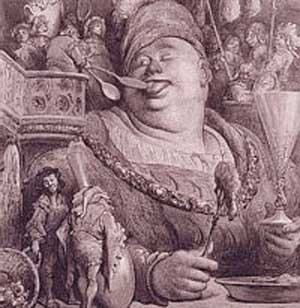11. Rabelais - Gargantua and Pantagruel (1532 - 1564)

Buy it
At Amazon UK
Review
Francisco: Well this was a fun read, albeit a bit too long for what it is. Gargantua and Pantagruel is actually composed of 5 books, bringing it to something like 700 pages in the Penguin edition. If it would be taken as 5 independent books it would probably be an easier read, when you get non-stop, hardcore satire for 700 hundred pages it stops having the same effect towards the middle. Gargantua is the first book story-wise but was published after book I of Pantagruel, making it one of the first prequels ever, I imagine.
This book actually surprised me, I had no idea it was so uncompromising not only on the language and subjects that it covers (lots of fart jokes and quite open sexual jokes) but also in ideological terms it surprised me. Rabelais' attacks on the church are quite scathing and when you think that one of the books is dedicated to a member of the clergy it shows a very open society. Rabelais wasn't persecuted for his writings, maybe because the whole book is quite a funny one and satirical, the Catholic church is just another target here.
The major problem with this book is the fact that it is so early. The novel form isn't very well developed and there is no overarching plot until book 3 when Panurge decides to get married. And that is a pretty loose plot as well. It is still a lot of fun to read, but it's definitely not for those who are squeamish about hard, soft or liquid shit. You can very much tell the Rabelais was a doctor by profession, his anatomical descriptions are some of the best stuff i've ever read.
Another great thing about Rabelais is his immense love for language, you can see that he's experimenting with language the whole way through the book. It is almost Joycean in his love of words and word creation.
Vanda: Ok, so I took almost three months to read through this book. I apologize and all.
The reason I took so long is because I hated it. Hated it, hated it hated it. Now this may be because I'm a girl, am not 11, and am not particularly fond of fart and poo jokes. Which pretty much sums up this book for me. I can't believe I was looking forward to satyres.
We have every conceivable nuance of toilet humour here. We have the chapter of young Gargantua trying out 300 different places to wipe his ass to find out which one is better, including his mother's gloves, dress, hats, curtains, different animals, different foliage, kitchen implements, etc. (the winner was the neck of a live goose). Then you have stories that you can just imagine being told by the aformoentioned 11 year old boy. "So he has this huge mule, right, and then it pisses, and there's this huge river, and it floods the whole of Paris, and everyone drowns!". "And he's so big, right, that he has whole cities in his teeth, and it's brilliant and really funny!"
So, uh, no, sorry. I'm probably missing the point here, I realize. I'm sure it had its saving graces, but even the thinly-veiled metaphors can only be described as stupid, it has a very very loose plot, and I just don't see the point. Sure, he was a monk, and a brave monk at that, but that doesn't make him a good writer. I'm just glad it's over, though I know there's even worse coming.
Final Grade
Francisco: 7/10
Vanda: 3/10
Trivia
Rabelais gave the name to the religious/occult movement of Thelema, founded by Aleister Crowley, who had read Rabelais foundation of the Abbey of Thelema in Gargantua.
From Wiki:
Rabelais has attracted many modern writers and scholars. Most notably, perhaps, was English mystic Aleister Crowley.
Anatole France lectured on him in Argentina. John Cowper Powys, D. B. Wyndham Lewis, and Lucien Febvre (one of the founders of the French historical school Annales) wrote books about him. Mikhail Bakhtin derived his celebrated concept of the carnivalesque and grotesque body from the world of Rabelais. Rabelais was also a major reference point for a few main characters (University Professors and Assistant) in Robertson Davies's novel The Rebel Angels, part of the Cornish Trilogy.

1 Comments:
At 5:50 AM, Gary said…
Gary said…
I side more with Francisco, particularly in terms of the linguistic play - those astonishing lists, for example, unlike anything I've ever read. A prodigious sense of freedom. But there again I side with Vanda on the terrible drudgery of some parts of it. It shouldnt be read as a chore, I think, since that kills it - probably it's best to take a year to read it a chapter at a time. By the way I'm doing something sort of similar over at How Books Got their Titles (http://garydexter.blogspot.com) where there's a post on Gargantua and Pantagruel, and have added you to my blogroll.
Post a Comment
<< Home